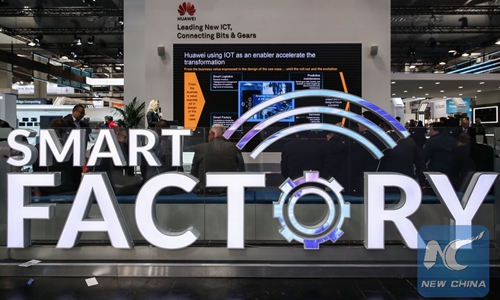HOME >> OPINION
Can Germany transcend ideological difference to form realistic China policy?
By Mao Xiaohong Source:Global Times Published: 2019/12/1 19:48:39

Photo taken on April 1, 2019 shows the booth of Huawei at Hanover Fair 2019 in Hanover, Germany. Photo: Xinhua
The Christian Democratic Union (CDU) of Germany - the country's ruling party whose former leader is German Chancellor Angela Merkel - held a conference on November 22 and 23 in Leipzig. The party made decisions on major issues including the candidate selection process and pension reform. Amid complicated international situation and volatile German politics, the CDU conference plays a significant role in German development and clarifies the country's role in its future internal and foreign affairs.However, whether Huawei should be allowed to participate in Germany's 5G rollout was one of the most important issues of the convention. It shows the technological issue has been hyped up into one that concerns geopolitics, national security and ideology. It also shows German politicians have huge divergences on the issue.
The moderates, represented by Merkel, believe that Germany should not rule out any company over political issues, but focus more on objective factors such as whether its technological security and standards meet German requirements. However, some hard-liners make it an ideological issue and believe Huawei should be excluded. The reason they provided is "no Chinese company is an independent company," adding that Huawei's involvement is principally "an imminent question of national security."
Merkel has withstood huge pressure and has not budged from her position in the conference. The CDU approved a motion to debate in parliament the involvement of Huawei in building Germany's 5G network. But the party also agreed that bidders of German 5G rollout contracts must guarantee the network is free of foreign state influence. This condition is equal for companies from the US, China and all the other countries worldwide. This shows a desire to maintain technological multilateralism.
If a major European mainstream party chooses technological multilateralism and abandons the choices that will further divide the world, it offers proof of its political maturity. This not only benefits Germany's interests, but also plays a vital role as a model for other Western countries embroiled in similar issues.
As Merkel said in 2017, Europe has to take its destiny in its own hands. It should not rely too much on the US like it used to. After WWII, the Marshall plan helped Germany's economic take-off and made it easier to restore social order. Thus, the US was regarded as the "liberator" of Germany. After the German reunification in 1990, the US - the winner of the Cold War - was regarded as the "savior" who helped reunify Germany. In the internet era, the US is regarded as leading country in many technological areas.
After decades of following the US, Germany has somewhat lost the ability to independently decide its development and destiny. But in recent years, the US has been pursuing unilateralism. The export-oriented German economy is affected by not only China-US trade conflicts, but also US threat of imposing tariffs on German products. Thus, it is time for Berlin to stop its fear of threats from Washington and make choices that are in line with its own interests.
Germany can strengthen its innovative development and technological cooperation with China through joint works with Huawei. Berlin could also set 5G technological and security standards with Beijing. This will help Germany offset its shortcoming in information and communications technologies and provide foundation for the country's political security, economic development and social stability.
There are still some German politicians deeply affected by stereotypes and Western media's negative opinions on China. When they talk about China, these people would think of ideological differences first. Although they understand that trade exchanges, technological cooperation and reciprocal China-Germany relations best fit German interests, they feel politically incorrect if they do not talk about so-called democracy, human rights and freedom of speech whenever China is mentioned. Such a mind-set will undoubtedly increase Germany's doubts over China and also harm Germany's own interests.
Disputes between China and Germany in recent years basically stemmed from some German forces' accusations over China's internal affairs. Chinese officials have never interfered in Germany's internal affairs, and never commented on the phenomena like neo-Nazism or the rising wave of anti-Semitism in the country. Instead, China believes the German government and people have the ability to resolve the problems.
Generally speaking, China-Germany relations have a solid and realistic foundation. The two countries can transcend differences in their systems and ideologies, jointly protect multilateralism, set an example of win-win cooperation, stabilize the global situation and bring more hope and benefits to the two peoples and people around the world.
The author is vice director at the institute of Sino-German People-to-People Exchange Center, Shanghai International Studies University. opinion@globaltimes.com.cn
Posted in: VIEWPOINT